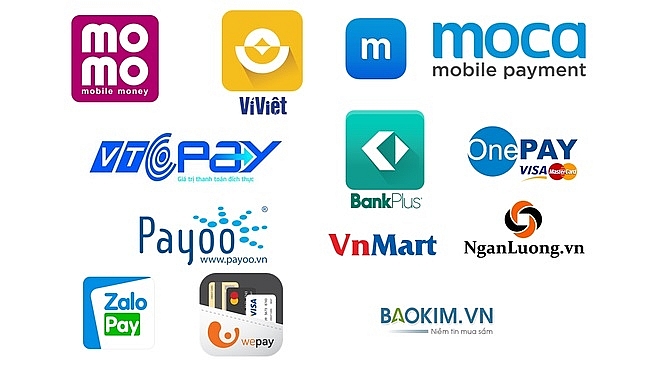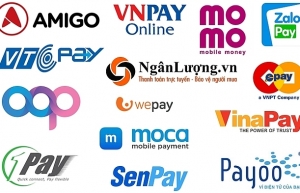Foreign funds to help domestic e-payment firms with competition
 |
| The domestic e-payment market will become more dynamic. Photo: theleader.vn |
OnOnPay and VNPay receive foreign investment
| Vietnam remains a promising e-payment market with the increasing number of Internet users and smart phone owners. According to the State Bank of Vietnam (SBV)’s survey, the number of transactions via mobile phones over 2017’s first nine months reached 90 million, up 93 per cent against 2016, and up 153 per cent against 2015. The number is expected to increase sharply in 2018. |
Investment fund Fenox Venture Capital from the US’ Silicon Valley has just confirmed pouring capital into domestic e-wallet application OnOnPay, but the value of the deal has not been revealed.
The US fund also stated that this is its first investment in Vietnam. OnOnPay’s current investor Capii Venture also joined the call for investment.
Previously, information about Fenox seeking investment opportunities in Vietnam was reported in November last year by Singaporean newswire DealStreetAsia.
Retno Dewati, director of Fenox’s Southeast Asia branch, said that its leaders were attracted to Vietnam’s dynamic start up climate and planned to invest in the country in 2018, with OnOnPay as the target.
On June 20, Vietnam Payment Solution JSC (VNPay) and UnionPay International signed the official agreement to co-operate on QR code payments.
VNPay’s representative said that entering into a co-operation with UnionPay is the firm’s big step into international payments.
VNPay also reported that over the past few years, the number of tourists from Korea, China, and Singapore traveling to Vietnam has increased. These customers have high spending potential and tend to use modern payment methods instead of cash.
“Carrying out quick and convenient payments with QR codes will improve tourist spending in Vietnam,” added the representative.
Utilities and difference are key to gain market share
Meeting consumer demand via various utilities and product and brand differentiation are the key factors in success. Foreign players like Samsung (Samsung Pay), and maybe GrabPay in the future, understand this and have better capabilities to develop new services, making life difficult for domestic e-payments firms.
According to Nhip cau dau tu magazine's survey and poll on the most popular e-wallets in Vietnam in 2018, Samsung Pay ranked second despite it being relatively new to Vietnam (it was launched in the country in 2017).
Accordingly, just by taking a picture of customers’ credit cards and adding credit card information (card number, name of card-holders, expiry date, and CVV code), consumers can easily conduct payments via Samsung Pay.
 Banks raise fees, e-wallet to be preferred Banks raise fees, e-wallet to be preferred |
Regarding Grab’s GrabPay, after a long time of being used in other markets, theleader.vn stated that Grab may launch GrabPay in Vietnam, allowing customers to pay for shopping and restaurants. Theleader.vn also speculated that GrabPay will be a strong competitor in the domestic e-payment battlefield.
Regarding domestic e-payment firms, MoMo remains the leading Vietnamese e-wallet with eight million customers and 5,000 points of transaction across the country. In 2016, MoMo also received $28 million of investment from Standard Chartered and Golden Bosh.
However, the distance between MoMo and other e-payment applications is not too large because rival apps offer very similar features to MoMo.
With Zalo Pay, Moca, VNSmart, and even OnOnPay, consumers can easily use many similar features, such as money transfer, topping up SIM cards, and consumer lending. Furthermore, these features are also found in the mobile banking services of most banks.
Domestic e-payment firms are facing the risk of being overwhelmed by foreign players as there are few differences between brands and services. However, the support from foreign funds is expected to create a breakthrough for domestic firms, increasing their competitive abilities.
What the stars mean:
★ Poor ★ ★ Promising ★★★ Good ★★★★ Very good ★★★★★ Exceptional
Related Contents
Latest News
More News
- EU and Vietnam elevate relations to a comprehensive strategic partnership (January 29, 2026 | 15:22)
- Vietnam to lead trade growth in ASEAN (January 29, 2026 | 15:08)
- Japanese business outlook in Vietnam turns more optimistic (January 28, 2026 | 09:54)
- Foreign leaders extend congratulations to Party General Secretary To Lam (January 25, 2026 | 10:01)
- 14th National Party Congress wraps up with success (January 25, 2026 | 09:49)
- Congratulations from VFF Central Committee's int’l partners to 14th National Party Congress (January 25, 2026 | 09:46)
- 14th Party Central Committee unanimously elects To Lam as General Secretary (January 23, 2026 | 16:22)
- Worldwide congratulations underscore confidence in Vietnam’s 14th Party Congress (January 23, 2026 | 09:02)
- Political parties, organisations, int’l friends send congratulations to 14th National Party Congress (January 22, 2026 | 09:33)
- Press release on second working day of 14th National Party Congress (January 22, 2026 | 09:19)

 Tag:
Tag:
























 Mobile Version
Mobile Version